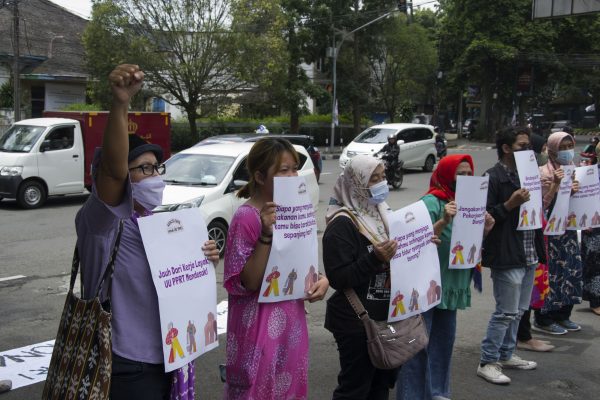It was only after neighbours broke into the house and found the severely wounded domestic worker that she was released and taken to hospital. After being treated, police questioned her and immediately arrested her employers.
Just one month later, another case of employers abusing their domestic worker arose in a different region. Compared to other workers in the informal sector, domestic workers are particularly vulnerable to violence and exploitation.
There is a lack of legal protection for domestic workers who are employed informally without a legal contract, regular working hours, or provisions for maternity leave, minimum working age and wage or social protection. The Employment Law of 2003 regulates such rights for formal workers, both for Indonesian and foreign workers, but domestic workers fall outside of this.
Domestic workers have limited recourse if their employers do not pay their monthly salary. This legal vulnerability has led to child labour abuse in which poor, underage girls have been paid below minimum wage. Very few domestic workers are registered in the social services system, preventing them from accessing unemployment benefits, life insurance and a pension.
There is also no single national database of domestic workers, which makes it impossible to monitor the wellbeing of the approximately 5 million domestic workers in Indonesia. The International Labour Organization estimates that ‘80 per cent of all domestic workers are women’, while underage female workers make up 30 per cent of the workforce. Most of these women and girls are breadwinners for their families.
There is still a deep-rooted perception in Asia that domestic workers are ‘slaves’ who do not deserve to be treated as equals. During the Dutch colonial era in Indonesia, many European families hired babus — a derogatory term to refer to an Indonesian female domestic worker. The word babu is still widely used to marginalise domestic workers and reinforce their position as second-class citizens.
There are at least four things that should be done to protect the rights of domestic workers.
The most important step is to formalise domestic employment so that it is covered by labour law. This will enable domestic workers to access legal minimum labour standards, labour dispute mechanisms and allow them to unionise. Civil societies and religious leaders should push the People’s Consultative Assembly to pass the Domestic Workers Bill, which has been dormant for nearly 20 years.
The government should ratify and adopt the International Labour Organization C189 Convention on Domestic Workers to lay the foundation for improving domestic workers’ rights. This Convention stipulates measures that should be taken by the government and employers to protect the rights of domestic workers, such as legal contracts, minimum wage, paid leave, overtime compensation and a safe working environment.
The labour union and other civil society groups established the Protection Committee for Domestic and Migrant Workers to advocate for C189 Convention ratification, but employers have strongly opposed this effort. To address this issue, there should be regular multi-stakeholder meetings between the government, employers, civil society groups and the labour union to reach an agreement.
It is also necessary to change the way society views domestic workers. Eliminating the word babu from public discourse to prevent the perpetuation of modern slavery is a start. The word pembantu rumah tangga (household helper) should also be replaced with asisten rumah tangga (household assistant).
To raise awareness about the use of language and how to treat domestic workers as equals, civil society should engage local and religious leaders. The Kongres Ulama Perempuan Indonesia, which brings together influential female Muslim leaders from Indonesia’s two strongest moderate and reformist Muslim organisations, can disseminate messages about domestic workers’ rights more efficiently through religious congregation, where many attendees employ domestic workers.
Relevant ministries and non-government organisations should collect and share data on domestic workers. Such a database will help the Ministry of Social Affairs deliver services and social assistance to domestic workers. This database should also link to an online complaint forum for domestic workers.
As Indonesia begins its ASEAN chairmanship in 2023, the country should emphasise its commitment to fighting discrimination against domestic workers and navigating strategies that leave no one behind.
Dian Maya Safitri is a public policy professional and a coordinating member of the Policies and Happiness Working Group at the Economy of Francesco, a faith-based economic movement supervised by the Vatican. She holds a Master’s degree in Public Policy from the London School of Economics and Political Science (LSE).

